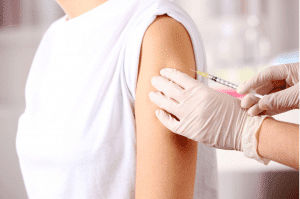Understanding HPV
HPV stands for Human Papilloma Virus and is a prevalent infection. It is as common as the flu virus, and it affects nearly 3% of women in Southeastern Asia (HPV Information Centre). Transmitted by skin to skin contact, the virus is widespread in people who have ever been sexually active.
There are many different types (or strains) of HPV, but they can be categorised as “low-risk HPV” and “high-risk HPV”. Low-risk HPV may cause genital warts but are not cancer-forming. High-risk HPV, however, can infect the cervix and has been shown to cause pre-cancerous changes, which can lead to cervical cancer.
While HPV infection has no treatment or cure, you can prevent it by getting vaccinated. Dr Ida Ismail-Pratt, our O&G Specialist and a strong advocate of the HPV vaccine encourages all ladies (and gents) to protect themselves by getting vaccinated against HPV. After all, getting vaccinated is the first line of defence against cervical cancers. In this article, Dr Ida also answers some commonly asked questions you might have about the HPV vaccine.
1. What is the HPV Vaccine?
The HPV vaccine is called a Viral-like particle (VLP). A VLP has no HPV DNA and is an empty protein coat. Because of this, the HPV vaccine confers immunity to future exposure without infecting the host.
The HPV vaccine protects you from future exposure to some of the most common cancer-related HPV infections. There are three types of HPV vaccines and you only need to get vaccinated with one of the vaccines. Here are the three types of vaccine available:
- Cervarix
- Gardasil
- Gardasil 9
Cervarix |
Gardasil |
Gardasil 9 |
|
|---|---|---|---|
Where can I get the HPV vaccine? |
|
|
|
Protection from Cancer causing HPV infection |
Yes Protects from: Protection from: |
Yes Protects from: Protection from: |
Yes Protects from: Protection from: |
Protection from future genital warts |
No |
Yes |
Yes |
Licensed in Singapore to be given to |
Boys and girls9 to 26 years old |
Boys and girls9 to 26 years old |
Boys and girls 9 to 45 years old |
*Please ask your doctor regarding availability and types of HPV vaccine if you are interested to know more
It is important to note that the HPV vaccine does not treat any current HPV infections you have been exposed to. The HPV vaccine has been designed and licensed to protect you from future cervical cancer and pre-cancer. It is one less cancer for you to worry about!
2. How Effective is the HPV Vaccine?
The HPV vaccine has been shown to provide more than 90% protection from cervical cancer. It also protects you from up to 7 cancer-related HPV by giving you protection between 70 to 90% of all cervical cancers worldwide, depending on the HPV vaccine that you take. To get the best protection, you are strongly advised to complete the injection regime.
Suppose you have completed the HPV vaccine injection. In that case, it is strongly recommended for you to continue with regular cervical cancer screening which also protects you from any cancer-related HPV types that are not covered by the HPV vaccine.
3. Is the HPV Vaccine Safe?
The HPV vaccine has a firm safety profile, backed up by the World Health Organization (WHO) and other safety committees worldwide.
The most common adverse effects reported are pain, slight swelling and redness at the injection site, and temporary headaches.
4. Who is the HPV Vaccine Suitable For?
The HPV vaccine is licensed to be given to both boys and girls:
Age 9 to 14 years old: 2 dose regime (0 and 6 months)
Age 15 years old and above: 3 dose regime (0, 1-2 and 6 months)
The best protection against HPV is getting vaccinated when you are young, having the lowest exposure to the virus. Even if you have potentially been exposed to HPV, you can still get the HPV vaccine. Your gynae will be able to advise you on this.
Conclusion
Combining HPV vaccination and regular cervical screening can provide the best possible protection against cervical cancer. In addition, the HPV vaccine reduces the risk of developing cancers caused by HPV at sites other than the cervix. Remember, HPV is preventable!
If you have not gotten your HPV vaccine yet, we offer the HPV vaccine at all our clinics. Click here to book your appointment now.
